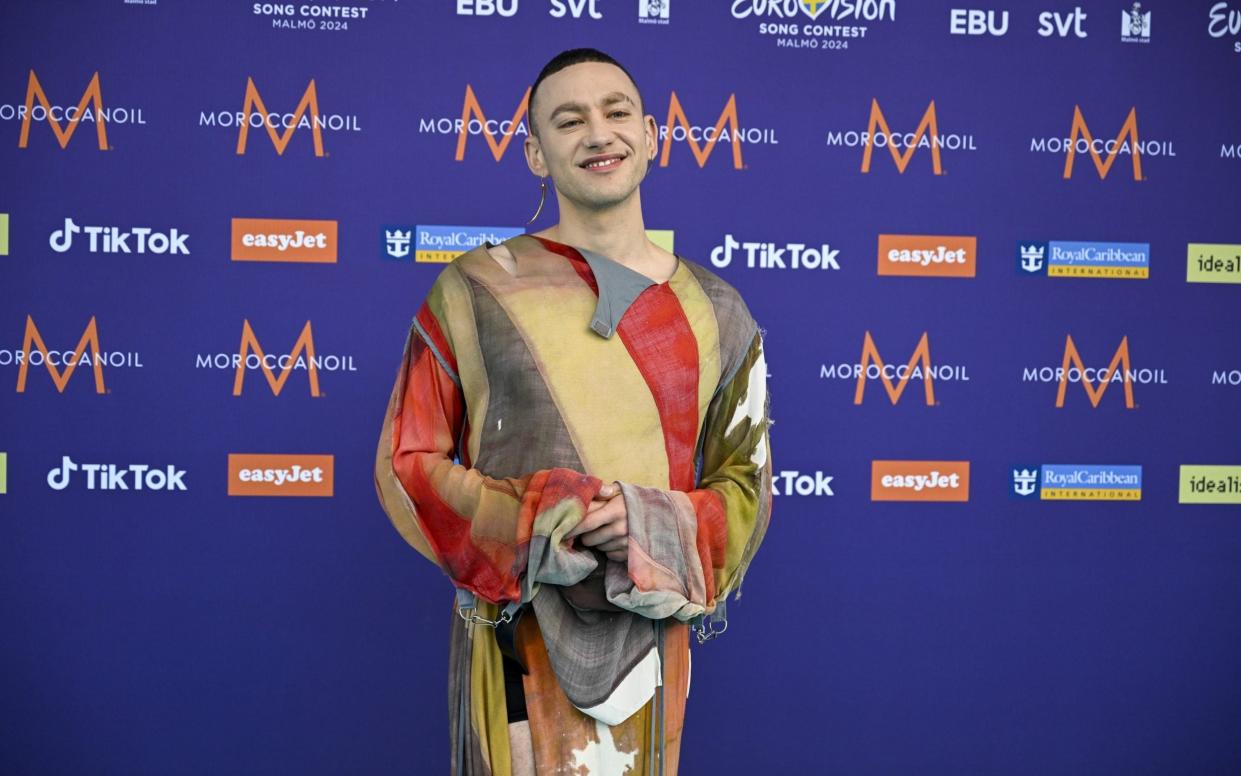Why I will join Queers for Palestine in turning Eurovision off this year

Lefties are boycotting this weekend’s Eurovision Song Contest, and so am I – though for subtly different reasons. The protesters are turning off because they say it elevates Israel, giving primetime to the “racist” state, even as it commits “genocide” in Gaza. I just think the whole show is pants.
I have a vision in my mind of what “class” is, and it’s Eurovision circa 1964: a pretty tune sung by a duchess and accompanied by a string section. The conductor wears tails. Alas, Europe has since been culturally colonised by America – disco was probably the beginning – and even as the definition of “European” expands (g’day Australia!) the music has homogenised into thumping, nightclub trash.
Taste and subtlety are dead. It’s as if, after two decades of eating nothing but curry, we can only be aroused by a piping hot vindaloo. Britain is sending Olly Alexander, who promised to take on Eurovision in “the gayest way possible” – previous contestants mostly sang hymns – and the choreography of his song Dizzy evokes an athletic orgy in a leisure centre changing room.
That’s positively twee compared with Ireland’s Bambie Thug (pronouns: they/them/whatever) whose mix of strobe lighting and goth horror are probably what it’s like to experience an epileptic fit in Hell. Hard to recall that this is the country that once sent Dana sweetly singing “All kinds of everything/ Remind me of you.”
Gibbon and Spengler were wrong. The decline of civilisation passes not from Rome to the barbarians, but from Dana to Dana International – though the West still has further to fall.
Dana International, the trans singer who won in 1998, is proudly Israeli, and thus today finds herself at odds with the same people who formerly regarded her as the embodiment of progress. Ms International has expressed surprise at support among LGBT activists for the Palestinian cause. “Are you aware,” she wrote, “that if you accidentally end up on the streets of Gaza, you won’t get out of there alive?”
The gayest event outside a Tory fundraiser at the Carlton is being hosted in the Swedish city of Malmo, which has a large Muslim population, in the middle of a war in Gaza, which is being gradually emptied of one.
Demonstrations are expected; the Israeli entry has been advised to remain in her hotel room between performances for her own safety. She was also forced to change her song, October Rain, because it was felt to reflect sympathy for the Jews murdered on October 7, and Eurovision doesn’t do politics.
Tell that to last year’s contest which was a coded celebration of the Ukrainian resistance. Tell that to the group Queers for Palestine (an affiliate of Turkeys for Christmas) which has called upon Olly and others to pull out of the show in defiance of its “pinkwashing” of Israel.
It’s been fascinating to watch Olly try to dance his way around this one. He once said “I fancy” Jeremy Corbyn, and signed a declaration condemning “zionist propaganda” – calling Israel an “apartheid regime” and support for Palestine a “queer issue” because its oppression is rooted in “colonialism, imperialism and capitalism”.
One suspects that, if Olly weren’t starring in Eurovision, he’d be one of the first people to condemn it. But now the poor chap sounds perilously like a rugby player defending a friendly with South Africa in the 1980s, insisting that Eurovision is “meant to be apolitical” (he acknowledges that this is “a fantasy”) and “it’s an incredibly complicated political situation, one that I’m not qualified to speak on”.
Well, I have a solution, one that increases representation, gives a platform to the marginalised and might even satisfy the Queers for Palestine. Next year, let Hamas send a song to Eurovision. Five men in balaclavas singing “Allahu-Akbar, ding-a-ling-a-ding-dong” would certainly be a blow for peace, though the drag queens in the front row might want to lower their rainbow flags for the duration.
Can Pinkerton be Korean? Why not
I took Mum to see Madame Butterfly at the Royal Opera House, another musical about colonialism. To recap: Lt Pinkerton, a sex tourist in all but name, visits Japan, gets 15-year-old Butterfly pregnant and disappears. Butterfly waits deludedly for his return. The most affecting part of the opera comes at the break of Act 2, as the heroine and her young son watch
Pinkerton’s ship sail into harbour. The lights dim, the violins pluck and the child falls asleep in her arms. Not a dry eye in the house.
In a bit of colourblind casting, the American Pinkerton was played by a Korean, SeokJong Baek. I’ll be honest: I was surprised at first, and there’s an obvious tension with the lyrics when his son is explicitly described as blond with blue eyes.
But Baek was simply superb, and as we agreed in the interval, given that the production is stuffed with Europeans playing stereotypes of Asians, why shouldn’t a Korean play a Caucasian? Concern about the artificiality of colourblind casting has to be balanced against the fact that art is, in and of itself, artificial. Can James Bond be black? Can any man – whatever his colour – drink six Martinis for breakfast and still shoot straight?
Pinkerton spurns Butterfly and she takes her own life, and when Baek took a curtain call my mother – looking quite mad – booed him as if he were actually Pinkerton. Disbelief is easy to suspend if the cast has talent.


